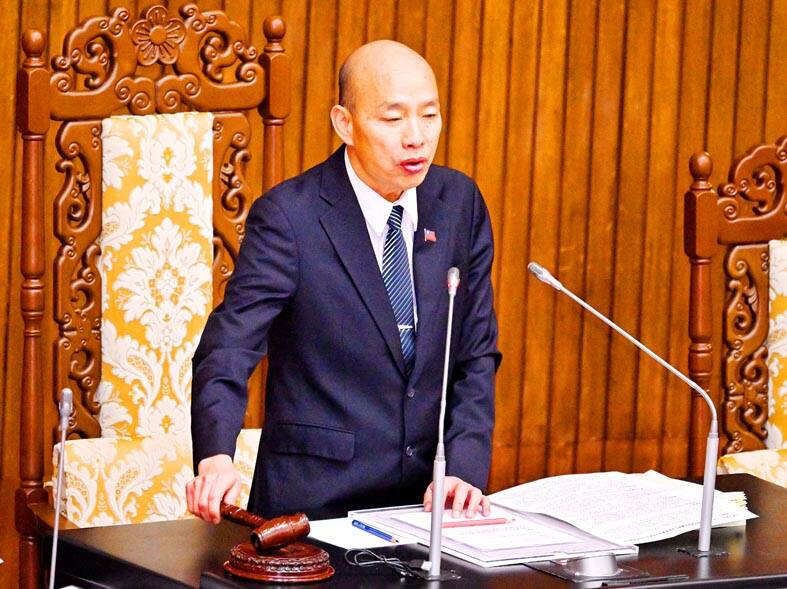The Legislative Yuan yesterday passed amendments to the Organization Act of the Council of Indigenous Peoples (原住民族委員會組織法) stipulating that the head of the Council of Indigenous Peoples would rotate between members of lowland and mountain indigenous groups while committee members from all indigenous groups would no longer be paid wages.
The amendments also state that two of the three deputy ministers must be from lowland and mountain indigenous groups.
The council should have between 19 and 29 members serving a term of two years, and they would be allowed to serve consecutive terms, the amendments say.

Photo: Liu Hsin-de, Taipei Times
The amendments also state that the positions would be unpaid.
The Council of Indigenous Peoples yesterday said the amendments severely undercut indigenous people’s rights, adding that it plans to contest the amendments or ask for the Constitutional Court for an interpretation.
The appointment of a minister to the council should be based on ability, and a policy forcing the rotation of such a position would prevent talented people from being selected, it said.
The amendments are at risk of legal overreach as they infringe on the premier’s right to appoint personnel, which contravenes Article 53 of the Constitution and Constitutional Interpretation No. 613, it added.
Democratic Progressive Party (DPP) Legislator Saidhai Tahovecahe (伍麗華) said that separating lowland and mountain indigenous groups was an antiquated relic of colonialism and that the amendment contravened the Constitution.
Chinese Nationalist Party (KMT) Legislator Sra Kacaw (鄭天財), one of the people who proposed the amendment, rebutted the accusation that the distinction was a relic of colonialism, citing how the distinction has been maintained by all iterations of the Local Government Act (地方制度法) throughout the years.
The amendment was a move to support indigenous peoples’ right to politics, he said.
Independent Legislator May Chin (高金素梅), co-author of the amendment, said that Saidhai Tahovecahe and others stood to benefit from the current system, adding that if every member of the council represented their people, 14 out of 16 would be DPP supporters.
Taiwan People’s Party (TPP) Legislator Chang Chi-kai (張啟楷) said that it was wrong for the DPP to place their supporters in the council and be paid by the state.

Taiwan is to commence mass production of the Tien Kung (天弓, “Sky Bow”) III, IV and V missiles by the second quarter of this year if the legislature approves the government’s NT$1.25 trillion (US$39.78 billion) special defense budget, an official said yesterday. Commenting on condition of anonymity, a defense official with knowledge of the matter said that the advanced systems are expected to provide crucial capabilities against ballistic and cruise missiles for the proposed “T-Dome,” an advanced, multi-layered air defense network. The Tien Kung III is an air defense missile with a maximum interception altitude of 35km. The Tien Kung IV and V

The disruption of 941 flights in and out of Taiwan due to China’s large-scale military exercises was no accident, but rather the result of a “quasi-blockade” used to simulate creating the air and sea routes needed for an amphibious landing, a military expert said. The disruptions occurred on Tuesday and lasted about 10 hours as China conducted live-fire drills in the Taiwan Strait. The Civil Aviation Administration (CAA) said the exercises affected 857 international flights and 84 domestic flights, affecting more than 100,000 travelers. Su Tzu-yun (蘇紫雲), a research fellow at the government-sponsored Institute for National Defense and Security Research, said the air

Trips for more than 100,000 international and domestic air travelers could be disrupted as China launches a military exercise around Taiwan today, Taiwan’s Civil Aviation Administration (CAA) said yesterday. The exercise could affect nearly 900 flights scheduled to enter the Taipei Flight Information Region (FIR) during the exercise window, it added. A notice issued by the Chinese Civil Aviation Administration showed there would be seven temporary zones around the Taiwan Strait which would be used for live-fire exercises, lasting from 8am to 6pm today. All aircraft are prohibited from entering during exercise, it says. Taipei FIR has 14 international air routes and

Taiwan lacks effective and cost-efficient armaments to intercept rockets, making the planned “T-Dome” interception system necessary, two experts said on Tuesday. The concerns were raised after China’s military fired two waves of rockets during live-fire drills around Taiwan on Tuesday, part of two-day exercises code-named “Justice Mission 2025.” The first wave involved 17 rockets launched at 9am from Pingtan in China’s Fujian Province, according to Lieutenant General Hsieh Jih-sheng (謝日升) of the Office of the Deputy Chief of the General Staff for Intelligence at the Ministry of National Defense. Those rockets landed 70 nautical miles (129.6km) northeast of Keelung without flying over Taiwan,